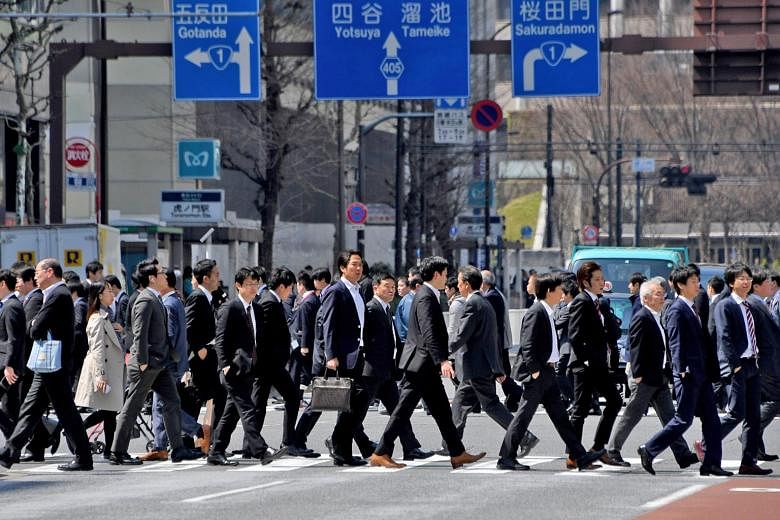TOKYO • Japan's once-mighty salarymen have taken a pummelling in recent years, with pay stagnating and rising numbers of working women and mothers eroding their once-dominant position as the family's breadwinner.
Those changes have affected how they are seen at home, with the percentage of Japanese children respecting their mothers surpassing the proportion for fathers for the first time, recent research said. And wives - who typically control the purse strings in Japanese households - have continued cutting their husbands' "pocket money", a survey by Shinsei Bank showed this week.
Over the past two decades, average male base wages have shrunk 0.5 per cent. And even though flat or falling prices mean there may have been little damage to purchasing power, the stagnation meant there has been little impetus for "pocket money" to rise.
Conversely, the increasing entry of women into the workforce has meant that their pay rose - up 15 per cent over the same period, according to a Labour Ministry report.
That increase might partly be to add to family incomes and make up for the flat salaries of husbands, but it is causing a change in how women are perceived at home, said the research from Hakuhodo Institute of Life and Living that is connected to one of Japan's largest ad agencies.
The number of children who said they respected their mothers surged to a record high of 68.1 per cent, surpassing that of fathers for the first time, according to the Hakuhodo survey, which has been conducted once a decade since 1997. About 62 per cent of children said they respected their fathers.
In 1997, the numbers were 54.8 and 59.7 per cent respectively.
-
68.1%
Percentage of children who said they respected their mothers, surpassing the proportion who respect fathers, according to the Hakuhodo survey, conducted once a decade since 1997.
"We suspect the relationship between mothers and fathers is changing because of the increasing number of double-income households," said the survey. "More mothers are working. They're working and flourishing outside the home, and they also take care of chores at home."
The survey added: "We think the extent of respect from children went up from seeing that up close."
While more fathers are helping out at home, there is still a long way to go. Even though working men have the same entitlement as women for parental leave after childbirth, only 55.9 per cent of fathers took time off after a child's birth in 2015. That compared with 82 per cent of women taking maternity leave, said a Labour Ministry report.
"Japanese men continue to face a tough environment," said economist Koya Miyamae at SMBC Nikko Securities. The men's "pocket money" has not risen in recent years. This stagnation is coming from concerns about wage growth, higher taxes and an ageing population, problems that are bigger than any one man, he said.
BLOOMBERG

